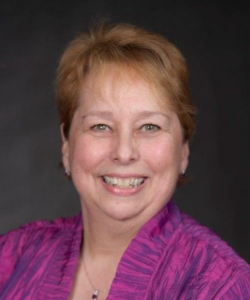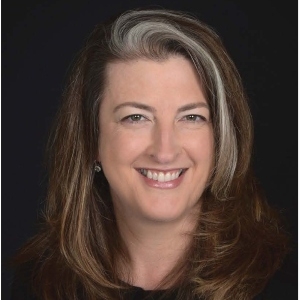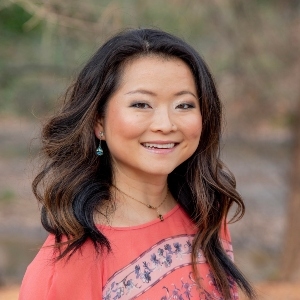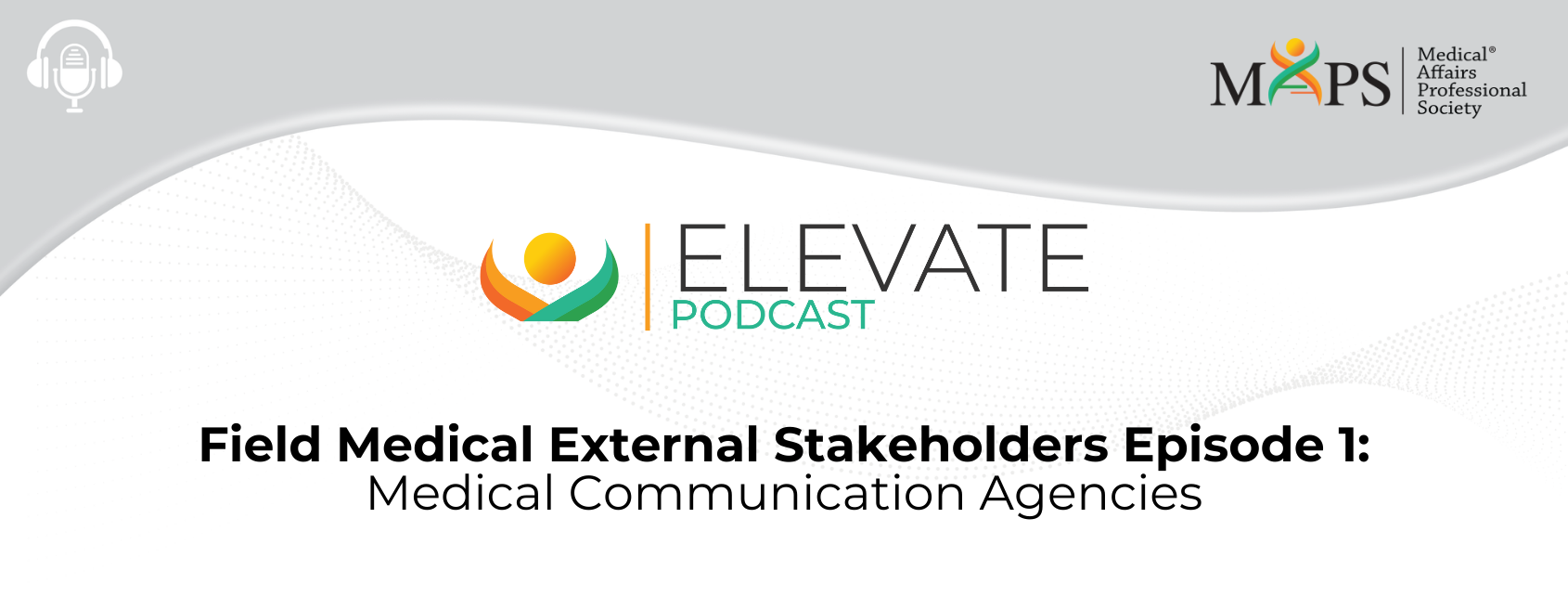Field Medical External Stakeholders: Episode 1 – Medical Communication Agencies
Objectives:
At the end of this series of podcasts, the participant should be able to:
- Discuss the functions and activities of key external partners
- Identify potential areas for compliant collaboration by MSLs with key external partners

MODERATOR: Kathryn Gann, PhD

INTERVIEWER: Deborah Crawford

INTERVIEWEE: Linda Beach, PhD
Following is an automated transcription provided by otter.ai. Please excuse inaccuracies.
Kathryn Gann 00:00
Welcome to the Medical Affairs Professional Society Field Medical Focus Area Working Group’s podcast series, entitled “Field Medical External Stakeholders: Partnering for Today and Tomorrow”. In this first podcast in this series, we will discuss partnering with Medical Communication agencies. I’m Kathryn Gann. I’m a member of the Field Medical Focus Area Working Group, and I’ll be the moderator for this podcast. Currently, I’m an independent consultant in Medical Affairs, having spent my 30-year career as an MSL, an MSL manager, and an MSL trainer. Our legal disclaimer is as follows. The views expressed in this recording are those of the individuals and do not necessarily reflect on the opinions of MAPS, or the companies with which they are affiliated. This presentation is for informational purposes only and is not intended as legal or regulatory advice. We encourage you to engage in conversations about Field Medical with other MAPS members via MAPS Connect on the MAPS website or mobile app. Simply log in with the email address and password associated with your MAPS account and access the Global Community. Then, click on the discuss tab and scroll down to Field Medical subject area to post a question, or to review previous postings. The objectives for this series of podcasts are that at the end of this series, the participant will be able to one, discuss the functions and activities of key external stakeholders and two, identify potential areas for compliant collaboration by MSL with key external stakeholders. I’d like to thank today’s panelists for sharing their subject matter expertise with the MAPS membership. Speaking today are Deborah Crawford, Director of MSL team, Teva Pharmaceuticals. Deb is also a member of our Field Medical Focus Area Working Group and, she’s going to be our interviewer. And Linda beach, Associate Medical Director, CMC Connect, which is part of McCann Health Medical Communications. Linda will be our interviewee. So, Deb, let me turn this over to you to kick us off, and maybe you can tell us a little bit about yourself.
Deborah Crawford 02:11
Thanks, Kathy, I’m really excited to be here today. While my background is actually as a veterinarian, I have now been in industry for 22 years in various roles in both the commercial and medical sides of the business. I’ve been with Teva now for almost seven years, and I am currently a National MSL Director. And now I’m going to turn it over to Linda so she can share a little bit of her background with us.
Linda Beach 02:40
Hi, everyone! First of all, thank you so much for inviting me to be a part of the series. It’s really a pleasure to be here. I have been in the Medical Communications space for approximately four years. Before entering this industry, I was actually an Academic Neuroscientist, working as a Postdoctoral Fellow in Atlanta at Georgia State University.
Deborah Crawford 03:03
Thanks, Linda, appreciate that information. And let’s dive right in and get started. In your role as an Associate Medical Director with a Medical Communications company, can you help us understand what it is that you do?
Linda Beach 03:19
Sure, absolutely. So, in my current role, I provide scientific leadership of account teams within TMC Connect with the ultimate goal of supporting the development and execution of various projects for our clients and their opinion leaders. And these internal teams can vary across accounts, but typically consists of a group of medical writers, and Client Services colleagues, and I work closely with various members of these groups to provide support and guidance to ensure that our medical deliverables are high quality and meet the needs of our clients. Externally, I liaise with our clients to facilitate the scientific work stream of ongoing projects. So, depending on the account that I’m supporting, these could include supportive US and global commercial and Medical Affairs team to develop medical content from marketed and pipeline products. So, for commercial teams, depending on the compound life cycle, this content can include sales training modules, mechanism of actions, digital assets, Speaker training decks, product spheres. For Medical Affairs, we also provide a breadth of medical content support, including for advisory boards, industry sponsored symposia, and scientific exchange meeting just to name a few. And a tremendously rewarding aspect of this role, I have to say is the opportunity to foster really collaborative relationships with our clients. I enjoy leveraging my breadth of Medical Communication expertise, and scientific acumen to provide some innovative ideas and creative recommendations to our pharmaceutical clients. And ultimately, I think I feel like I’ve done my job if I can make them look good in front of their colleagues and their key medical experts.
Deborah Crawford 05:12
Hey, sounds like you have quite a bit going on. One thing you just mentioned, was the collaborative relationship. And I would actually like to explore that a little bit more from the MSL perspective. For starters, can you give us what your understanding is of the MSL role?
Linda Beach 05:33
Sure. So, in my working experience, MSL is to facilitate the distribution of very high quality medical and scientific information to the medical community for which they support depending on their therapeutic area. And so, what I’ve seen is that they are really the field experts. And in that capacity, they have to establish, develop and maintain relationships with medical experts in their area. And that’s to ensure at the end of the day, they are appropriately disseminating clinical data regarding their compounds.
Deborah Crawford 06:10
Wonderful. And can you share with us a little bit more about how exactly you interact with MSLs?
Linda Beach 06:17
Yeah, so, I’ve worked with MSLs, through various projects. And in my experience, it really does vary from client to client. And I’ve noticed that it’s often determined by the management and training style of the medical training leader who oversees the educational material portfolio for his or her MSL. So, for example, one of my previous clients really wanted MSL to be fully invested in their education and the materials that they use. So, for that client, I actually established great working relationships with MSLs, through developing content for advisory boards, and through meeting them during on-site wide reviews and scientific support. And additionally, I’ve also been invited to certain focus groups with entire global NFL teams. And as you can imagine, that is logistically a challenge. But this group that I was working with really valued the input of the global MSLs in the field. And so they were always invited to these focus groups with the med comms agency, to brainstorm approaches for refining their existing educational assets, really to improve the utility and their learning retention. And furthermore, the MSL even had the opportunity to review the content material and provide feedback on the flow and the content before it was all finalized with compliance for dissemination. And so, in this one particular circumstance, the MSL manager was heavily invested in meeting the training needs of the field experts and regularly solicited feedback on materials that we develop.
Deborah Crawford 08:02
Thanks. Sounds like you’ve actually had a lot of great opportunities for that partnership and collaboration.
Linda Beach 08:09
Absolutely. And I really enjoyed that.
Deborah Crawford 08:12
Yes, I’m glad. And that actually is going to kind of move us into our final question, when thinking about those experiences that you’ve had. And can you just share with us what it is that you feel differentiates a really good MSL?
Linda Beach 08:29
Yeah, so in my experience, I always appreciate the MSL who seems very engaged and very plugged into their own, perhaps unmet educational needs. I think it’s important for anyone to really take stock of what materials or content might best serve you in your career. And so, it’s no different for MSL, I think it’s really valuable for MSLs to take stock of what content might serve them in the field because they are really the face of the company. And so, they are developing relationships with experts. So, for me, a differentiating characteristic of a great MSL is one who is always advocating for his or her own training needs.
Deborah Crawford 09:12
Wonderful and I actually, I couldn’t agree with you more. I think growth and development is so important for each and every one of us and certainly a never-ending conquest. So, once again, I want to say thank you, Linda, it has been wonderful chatting with you, and we appreciate your time. Kathy, I’m going to turn it over to you again.
Kathryn Gann 09:34
Thank you, Deb. And thank you, Linda, and I want to thank you both for participating today. I think that our audience should now have a better understanding of the breadth of the activities that a Medical Communication agency has and someone in Linda’s position particularly, and also how she and others can interact with medical and with MSLs, and I can speak from experience of having worked with multiple Medical Communication companies that it is always better when an MSL can have some input into things, because certainly we’re the ones who understand what our thought leaders are looking for. And so, while we aren’t always actively involved, it’s always very nice when a Medical Communication agency like Linda says, comes and kind of asks us for our advice. So, I think that’s something for our MSLs is to keep in mind that there are ways to have input into things that our thought leaders see. So, with that, I’d like to close this out. And this has been the first podcast in this series on the topic of Field Medical, External Stakeholders Partnering for Today and Tomorrow. So, if you are a MAPS member, thank you so much for supporting MAPS. And if you’re not yet a MAPS member and would like access to additional resources in this area, please visit the MAPS website to explore joining. And that website is MedicalAffairs.org/membership. This concludes the podcast.






